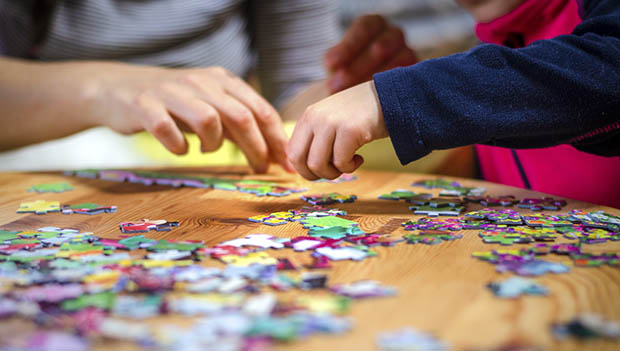Puzzles help your child learn important skills piece by piece, little by little. This is a great way to help kids develop important skills that will help them grow and become smarter. But how do puzzles for kids help them grow?
Puzzles help kids grow mentally, physically, and emotionally by developing their Motor Skills, Concentration, Visual Perception, Eye-Hand Coordination, Cognitive function, and Confidence.
In this article, we will take a closer look at the puzzles for kids, how they can help them to develop and which type of puzzle will best suit your toddler. So, let us dive right in.
Why Puzzles For Kids?
Puzzles are a great way to help your toddler grow and develop essential skills. These are entertaining ways to keep kids engaged while helping them develop important problem-solving, cognitive, and motor skills.
Additionally, puzzles are a great way to encourage kids to work independently and use their imaginations. Here are how puzzles can help your kids grow their skills:
Puzzles Develop Fine Motor Skills
Puzzles are a great way to practice fine motor skills. When doing puzzles, young kids and toddlers develop their fine motor skills.
The small muscles in your kids’ finger and wrists works altogether while puzzling. To put the puzzle pieces together, your kid must carefully gather them up, flip them, and then keep them in place. This needs strong control.
However, ensure the puzzle piece’s size is suitable for the kid’s age and development, much as with other fine motor exercises. Before they learn to manage little puzzle pieces, younger toddlers require practice with bigger puzzle pieces.
Improves Concentration
Puzzles can help kids to learn how to think critically, develop problem-solving skills, and increase their ability to focus. When children are solving puzzles, they need to think of different ways to solve them.
Additionally, this encourages them to use their imagination, analyze the problem and come up with their own solution. As they do this, they develop their cognitive skills, as well as their capacity for concentration and focus.
Improves Visual Perception
Putting together puzzles is an important part of developing visual perception in children. Visual perception is the ability to interpret the shapes, pictures, and forms of puzzle pieces to understand how they fit into a larger framework.
This ability is essential for building reading, writing, and pre-writing skills. Through puzzling, kids can hone visual perception, which is a precious tool in their primary literacy and pre-writing development.
Eye-Hand Coordination Development
Eye-hand coordination is an essential skill for children to develop as they grow. It involves the coordination of the eyes and hands to perform tasks such as catching a ball, tying a shoelace, or constructing puzzles. Also, puzzles can help children improve their visual-motor integration and eye-hand coordination from a young age.
Eye-hand coordination is an essential skill for children to develop as they grow. It involves the coordination of the eyes and hands to perform tasks such as catching a ball, tying a shoelace, or constructing puzzles. Also, puzzles can help children improve their visual-motor integration and eye-hand coordination from a young age.
These are also essential skills for learning to write. By playing with puzzles, children can practice and strengthen their eye-hand coordination and ultimately improve their visual abilities.
Cognitive Development
Introducing children to jigsaw puzzles at an early age has several cognitive benefits. Solving these puzzles is a great way to measure and develop your child’s cognitive progress. As they grow, you’ll notice a shift in how they approach puzzles. Where a toddler might experiment with pieces, an older child will start to match the pieces according to the image.
Building and solving puzzles requires a certain level of cognitive development in children, which you can observe as they begin to understand how pieces fit together and recognize patterns.
In addition, you’ll notice that your kids will develop their own techniques, such as beginning with similar-looking pieces or creating the border first. All of these skills are essential for helping to develop your child’s cognitive progress.
Builds Confidence
Completing a puzzle successfully can be an incredible experience for children. Not only does it boost their self-confidence, but it also gives them a sense of accomplishment and competence.
That’s why it’s important to choose puzzles that are suitable for their age and level of understanding. If it is too difficult, they may give up in frustration before they finish; if it is too easy, they won’t gain the sense of accomplishment they need to build their confidence truly.
Finding that sweet spot where puzzles are just challenging enough to be fun and engaging is vital to boosting your child’s confidence.
Puzzles for Different Ages
Puzzles are a great way to challenge and engage kids of all ages. Different puzzles could be more suitable for aiding your toddler in developing their cognitive abilities according to their age. According to your child’s age, you can try the following puzzles:
Ages 2-3: For 2-year-olds, jumbo knob pieces and baby pull carrot sets work nicely. Your kid may start with only two or three pieces. As your kid grows, they should add up to 20 pieces for a 3-year-old. Additionally, playing with building blocks may aid in your kid’s development of their gross motor abilities.
Ages 4-5: Construction sets or geometric baby toys may be given to your children at this age. But be careful that the pieces aren’t too little to ingest. At this age range, your kid can usually manage to play with up to 50 pieces of a Jigsaw puzzle.
Ages 6–7: Children between the ages of 6 and 7 may play with puzzles containing around 120 pieces. Kids’ fine motor abilities improve as they move away from maxi-block puzzles.
Ages 8–9: Depending on their development, children of this age group should be able to complete puzzles between 250 to 500 pieces. Children should practice tactical problem-solving techniques by organizing puzzles according to size, color, or shape.
Ages 10+: With enough effort or guidance, children aged 10+ should be able to complete any size puzzle, like the 3D puzzle board game. These youngsters must be able to put together puzzles of all kinds and should have acquired the necessary motor skills.
Conclusion
Puzzles are a great way to help kids develop essential skills that will help them grow and become more intelligent. Puzzles are a fun and engaging way to learn, which also help to promote problem-solving and creative thinking.
After reading the article, we hope you now have a clear idea of how puzzles for kids help them grow. We hope you find the right puzzle for your kid and help him or her to become smarter.

